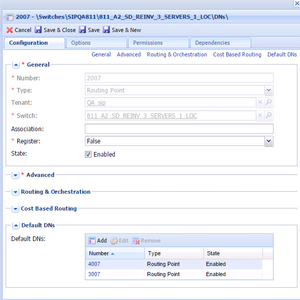Alternate Routing for Unresponsive URS/ORS
Contents
SIP Server supports delivering calls to an alternative location in situations in which the Universal Routing Server (URS) or Orchestration Server (ORS) becomes non-operational or unresponsive. If enabled, SIP Server sends the call to a specified alternate DN should URS/ORS fail, or if the call waits too long on a Routing Point.
You can now configure multiple destinations for alternate routing.
In multi-site deployments, calls can be routed by using route or direct-uui ISCC transaction types, or by using the ISCC Call Overflow mechanism. If route or direct-uui transaction types are used, Genesys recommends configuring inbound trunks with OOSP (Out Of Signaling Path) for efficient use of alternate routing. That way, a call is removed from SIP Server, minimizing its load.
In addition, with this enhancement:
- When multiple alternate destinations are configured, including those located on different switches, SIP Server load balances them in a round-robin manner.
- SIP Server prevents loops in the routing path by ignoring all destinations that were already tried, and rejects the call if none are available.
- SIP Server supports standard log event 52053 for an alternate routing indication.
Feature Configuration
- Use the Application-level option alternate-route-profile to define a valid Routing Point DN that contains a Default DNs list. SIP Server uses that list when it encounters a Routing Point with an empty Default DNs list.
- Set the parameter alternate-route-cof to true to specify that alternate routing uses the ISCC Call Overflow feature.
alternate-route-profile
Setting: Application level
Section: TServer
Default Value: An empty string
Valid Values: A Routing Point DN with non-empty Default DNs list
Changes Take Effect: For the next default routing
Defines a Routing Point DN with a Default DNs list in its configuration. This list is used for alternate routing for all Routing Points with an empty Default DNs list.
alternate-route-cof
Setting: ISCC Protocol Parameters field of the Switch Access Code configuration object
Default Value: An empty string
Valid Values: true, false
Changes Take Effect: After SIP Server restart
When set to true, SIP Server uses the ISCC Call Overflow (COF) feature for alternate routing.
Feature Limitations
- Alternate routing does not support default access codes.
- SIP Server does not trigger alternate routing when the router-timeout timer is in progress and a URS disconnects from SIP Server, or when SIP Server submits a TUnregisterAddress request from the last T-Library client registered on this Routing Point. SIP Server triggers alternate routing only when the router-timeout timer expires.

